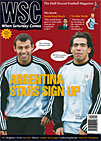 Cameron Carter observes how Mark Lawrenson is slowly veering away from what he's put there to be – a pundit
Cameron Carter observes how Mark Lawrenson is slowly veering away from what he's put there to be – a pundit
John Helm must have done something quite bad, but not dreadful, in a previous life. Perhaps he murdered a cow or was a slum landlord with only one slum. Whatever it was, in his current incarnation he has been forced to eternally comment on the UEFA Cup on Five. Because of his lack of options, Helm can’t make like Alan Green if the action’s a bit slow and tell everyone how bored he is; instead he must remain upbeat at his vigil and keep his and everyone else’s spirits up. As Newcastle toiled away against Ventspils of Latvia, many of us were reaching for the off switch and resignedly contemplating housework. Helm sensed this. “It’s an interesting game,” he pleaded, “without goals.” A slight pause. “Eleven minutes to the break,” he went on, in the preoccupied tone of a man who was calculating that in seconds.
But, interesting though the match apparently was, he initiated a discussion with co-commentator John Barnes on Accrington Stanley’s recent resurgence and the decline of Bradford Park Avenue. A few minutes later, with the interval in sight, Helm was reduced to rock-bottom cliche. “Psychologically it would be a good time to score now, five minutes before the break.” Our host was by now marking off the time in 30-second segments.
A couple of days earlier, Cesc Fábregas had shown just how English he has become in his short time in London. While he was being interviewed at the side of the pitch after Arsenal’s win at Dinamo Zagreb, a moody-looking Croatian steward bumped into him (despite seeming to have rather a lot of space to avoid this). Fábregas broke off from describing his goal to turn round and apologise. Thierry Henry may have an English wife, but he’ll never be that English.
Mark Lawrenson is fast becoming a problem pundit. He began the season quipping like crazy through the England v Greece friendly, as if he were aiming for the contribution of a Have I Got News For You panellist rather than a co-commentary on an international football match. Jonathan Pearce, attempting to impart information and comment for our visually impaired friends, found himself treated as a straight man by his sparking sidekick. The self-styled “Lawro” continued in the same vein in the first Football Focus of the season, a programme that included, incidentally, only Shevchenko’s Community Shield goal and England’s and Northern Ireland’s midweek goals as momentary action breaks in the interview and panel debate monotony.
Towards the end, when Martin Keown was veering towards the profound in his valedictory speech on Highbury, Lawrenson interrupted to banter with Lee Dixon about the full-back’s performance in Dennis Bergkamp’s testimonial. I would place a largish bet that Keown doesn’t get introspective in public very often and Lawro spoiled the moment for all of us with his childlike delight in verbal man-on-man play-fighting.
Football Years (Sky Three) is a cheap and easy way of making television, but, if you’re going to make a cheap and easy programme, this is the way to go about it. The story of a season’s progress with contemporary news footage thrown in as instant context, Football Years landed in 1990-91 to detail the season Arsenal won the title despite a two-point deduction for the 21-man brawl with Man Utd. John Fashanu, a man one would normally walk into an opera to avoid, actually showed a glimpse of deadpan humour in his description of the Battle of Old Trafford: “What was nice was, everyone got involved.” Which just goes to show that, if you edit people into snippets, absolutely anyone can become bearable.
Sky’s Soccer Saturday retains the winning formula of Jeff Stelling’s speaking head above an unceasing ticker-tape of facts. Sometimes old pros drift on camera to discuss some issue heatedly, but really you just want it to go back to Jeff’s speaking head and the facts. The only problem is, the information is rammed through repetition into the memory without being properly processed. This results in a kind of factual indigestion. All the next day I knew and wanted to tell people that West Ham haven’t won at Anfield since 1962, but simply couldn’t bring it up.
As a postscript, two early awards: the 120 Days of Christmas Prize goes to Chris Kirkland on August 26’s Soccer Saturday, for agreeing how fortunate his family were to cash in on his first England cap “with Christmas coming up”. While the Eye-Blink Self-Contradictory Prize goes to Jim Rosenthal, talking us through the highlights after Liverpool won their Champions League tie: “It’s a £12 million game, this one. And this save from Reina, absolutely priceless.”
From WSC 236 October 2006. What was happening this month